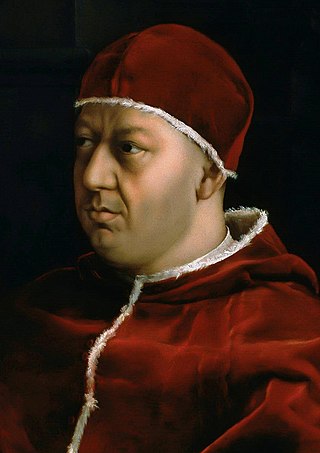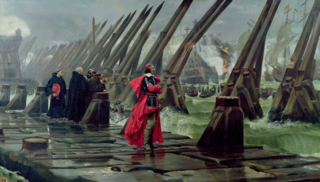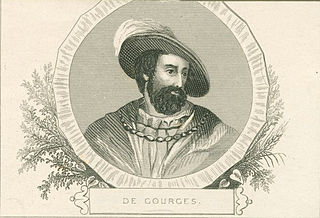
Pope Leo X was head of the Catholic Church and ruler of the Papal States from 9 March 1513 to his death in December 1521.

Theodore Beza was a French Calvinist Protestant theologian, reformer and scholar who played an important role in the Protestant Reformation. He was a disciple of John Calvin and lived most of his life in Geneva. Beza succeeded Calvin as the spiritual leader of the Republic of Geneva.

La Rochelle is a city on the west coast of France and a seaport on the Bay of Biscay, a part of the Atlantic Ocean. It is the capital of the Charente-Maritime department. With 75,735 inhabitants in 2017, La Rochelle is the most populated commune in the department and ranks fifth in the New Aquitaine region after Bordeaux, the regional capital, Limoges, Poitiers and Pau. Its inhabitants are called "les Rochelaises" and "les Rochelais".

Antoine de Bourbon, roi de Navarre was the King of Navarre through his marriage to Queen Jeanne III, from 1555 until his death. He was the first monarch of the House of Bourbon, of which he was head from 1537. Despite being first prince of the blood he was dominated by king Henry II's favourites the Montmorency and Guise families in regards to political influence. When Henri died in 1559 he found himself sidelined in the Guise-dominated government, and then compromised by his brother's treason. When Francis in turn died he returned to the centre of politics, becoming Lieutenant-General of France, and leading the army of the crown in the first of the French Wars of Religion. He died of wounds sustained during the Siege of Rouen. He was the father of Henry IV of France.

The siege of La Rochelle was a result of a war between the French royal forces of Louis XIII of France and the Huguenots of La Rochelle in 1627–28. The siege marked the height of the struggle between the Catholics and the Protestants in France, and ended with a complete victory for King Louis XIII and the Catholics.
MawlayMohammed al-Shaykh al-Sharif al-Hassani known as Mohammed al-Shaykh was the first sultan of the Saadian dynasty of Morocco (1544–1557). He was particularly successful in expelling the Portuguese from most of their bases in Morocco. He also eliminated the Wattasids and resisted the Ottomans, thereby establishing a complete rule over Morocco.

Dominiquede Gourgues (1530–1593) was a French nobleman and soldier. He is best known for leading a privateer attack against Spanish Florida in 1568, in retaliation for the no quarter given after the capture of Fort Caroline and the subsequent Massacre at Matanzas Inlet. He was a captain in King Charles IX's army.

The Roman Catholic Archdiocese of Clermont is an archdiocese of the Latin Church of the Roman Catholic Church in France. The diocese comprises the department of Puy-de-Dôme, in the Region of Auvergne. The Archbishop's seat is Clermont-Ferrand Cathedral. Throughout its history Clermont was the senior suffragan of the Archdiocese of Bourges. It became a metropolitan see itself, however, in 2002. The current archbishop is François Kalist.

The Roman Catholic Diocese of La Rochelle and Saintes is a diocese of the Latin Church of the Catholic Church in France. The diocese comprises the département of Charente-Maritime and the French overseas collectivity of Saint-Pierre and Miquelon. The bishop is a suffragan of the Archbishop of Poitiers. The episcopal seat is in La Rochelle Cathedral. Saintes Cathedral is a co-cathedral.

Surgères is a commune in the Charente-Maritime department, southwestern France. It is the home of the Surgères 48 Hour Race.

Albert de Gondi, duc de Retz seigneur du Perron, comte, then marquis de Belle-Isle (1573), duc de Retz, was a marshal of France and a member of the Gondi family. Beginning his career during the Italian Wars he fought at the Battle of Renty in 1554, and in many of the campaigns into Italy in the following years, before returning to France for the disastrous battle of Saint-Quentin and battle of Gravelines both of which saw the French army savaged.

The Recovery of Ré Island was accomplished by the army of Louis XIII in September 1625, against the troops of the Protestant admiral Soubise and the Huguenot forces of La Rochelle, who had been occupying the Island of Ré since February 1625 as part of the Huguenot rebellions.

The Huguenot rebellions, sometimes called the Rohan Wars after the Huguenot leader Henri de Rohan, were a series of rebellions of the 1620s in which French Calvinist Protestants (Huguenots), mainly located in southwestern France, revolted against royal authority. The uprising occurred a decade after the death of Henry IV who, himself originally a Huguenot before converting to Catholicism, had protected Protestants through the Edict of Nantes. His successor Louis XIII, under the regency of his Italian Catholic mother Marie de' Medici, became more intolerant of Protestantism. The Huguenots tried to respond by defending themselves, establishing independent political and military structures, establishing diplomatic contacts with foreign powers, and openly revolting against central power. The Huguenot rebellions came after two decades of internal peace under Henry IV, following the intermittent French Wars of Religion of 1562–1598.

The Allied siege of La Rochelle occurred during the Second World War in 1944–45, when Allied troops invaded France. La Rochelle was an important German naval base on the Atlantic for surface ships and submarines, from which U-boat campaigns were launched.
Michelangelo Florio (1515–1566), born in Florence, dead in Soglio, was the son of a Franciscan friar, before converting to Protestantism. He was a pastor in both England and Switzerland, and father of the renaissance humanist John Florio.
Pierre Richier, also Pierre Richer, dit de Lisle, was a French Calvinist theologian, who accompanied Philippe de Corguilleray on a French expedition to Brazil in 1556, to reinforce the colony of France Antarctique. He was a member of a contingent of 14 Calvinist people dispatched from Geneva. He later became the main actor in developing La Rochelle as a Huguenot capital.

Henri de La Trémoille was the 3rd Duke of Thouars, 2nd Duke of La Tremoille, and Prince of Talmond and Taranto. He was the son of Claude de La Trémoille and his wife, Charlotte Brabantina of Nassau, and a descendant of the medieval general Louis II de La Trémoille.
Jean de Serres was a major French historian and an advisor to King Henry IV during the Wars of Religion that marred the French Reformation in the second half of the Sixteenth Century. As a refugee from religious persecution, he was educated in Switzerland and became a Calvinist pastor, humanist, poet, polemicist, and diplomat. His complete translation of Plato appeared in the famous 1578 edition published by Henri Estienne, which is the source of the standard 'Stephanus numbers' still used by scholars to refer to Plato's works. In 1596, de Serres was appointed 'Historian of France' by King Henry IV. His posthumously published History of France was an 'immense success' and was not superseded for almost a century.

The Church of the Blessed Sacrament is a Roman Catholic parish located in New Rochelle, New York. Blessed Sacrament was founded in 1874 and its present-day church building was constructed in 1897. Its predecessor, St. Matthew's Church, was founded in 1848. Blessed Sacrament Church is listed as a New Rochelle Historic Site.
The Turffontein Reformed Church was a congregation of the Dutch Reformed Church in South Africa (NGK) in southern Johannesburg, Transvaal. It was founded in 1906 and for years had a large membership, at times exceeding 3,000.